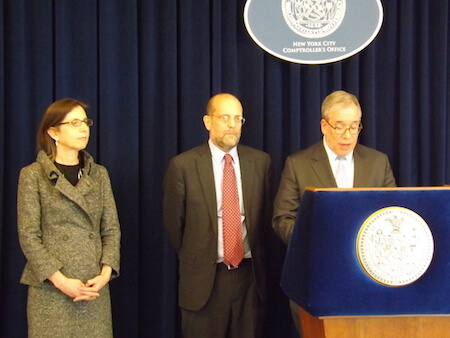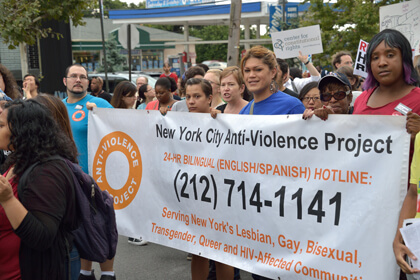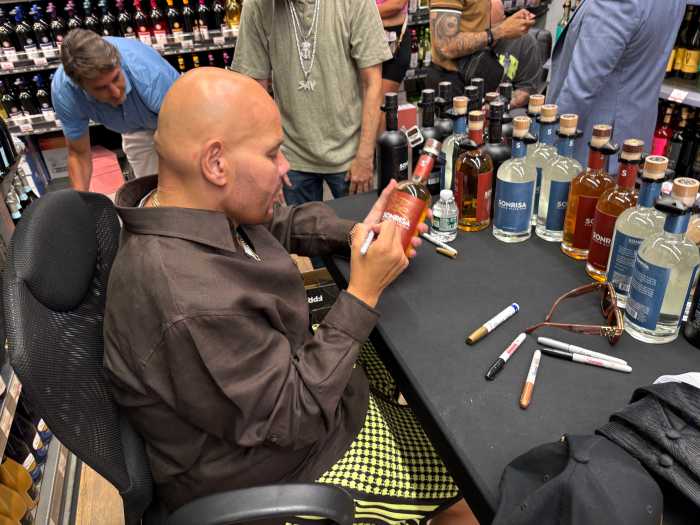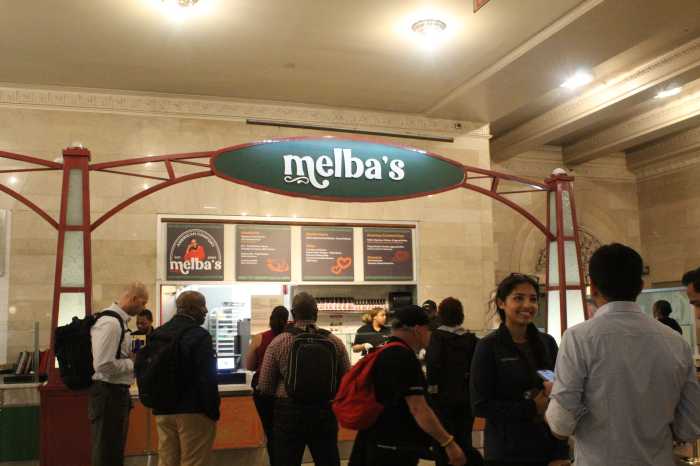City Council Speaker Christine Quinn with leaders of the Retail, Wholesale and Department Store Union, including (to her immediate left, front row) its president Stuart Appelbaum. | RWDSU
When the Retail, Wholesale and Department Store Union (RWDSU) recently announced its endorsement of Christine Quinn for mayor, the move provided bragging rights to a campaign looking to dispel any narrative that progressive forces in the city might be looking for an alternative to the City Council speaker, criticized in some quarters for her close ties to three-term Mayor Michael Bloomberg.
The endorsement was particularly significant given RWDSU’s high profile on questions of economic and social justice and its fierce opposition to the mayor’s reelection in 2009, a stance that angered top lieutenants in the Bloomberg campaign.
“We are a progressive, activist union that represents and organizes the most vulnerable and marginalized workers in our city today,” said Stuart Appelbaum, president of RWDSU, which has been particularly active recently in efforts to unionize car wash operators. “We believe Chris Quinn will be a progressive, activist mayor for those workers and their families, a strong, determined mayor who will help make the American dream a reality for many New Yorkers struggling to survive. She has made city government more responsive and attuned to underserved communities and to people who feel invisible and forgotten.”
In an interview with the New York Times hours before the January 31 endorsement was announced, the speaker termed it “a huge Good Housekeeping Seal of Approval.”
In rolling out its choice, RWDSU became only the second union to make an endorsement in the mayor’s race, where party primaries are likely to be held in September in advance of the November general election. Quinn snagged the other nod, as well — from grocery workers Local 1500 of the United Food and Commercial Workers Union, which has frequently made early political endorsements.
Despite retail workers’ early nod, most unions likely to stay on sidelines for now
Whether Quinn will be able to quickly capitalize on the momentum from her Local 1500 and RWDSU endorsements, however, is unclear. Union sources have told Gay City News that other key labor players in the city — such as the United Federation of Teachers, building services workers affiliated with Local 32BJ of the Service Employees International Union, SEIU’s Local 1999 representing health care workers, and District Council 37, the city’s largest municipal employees’ union — are likely to hold back from any early endorsement and may work to coalesce around a single candidate.
That scenario was also spelled out in a February 11 story in Crain’s New York Business, which reported that 35 unions affiliated with the city’s Central Labor Council agreed to such a strategy last month.
“It’s an effort to be more collaborative and have a more coherent process,” one labor source told Crain’s. “The mayor’s race is full of candidates with deep ties to labor and the effort is to make sure [the CLC endorsement decision] is as democratic as possible.”
Two of Quinn’s rivals — Public Advocate Bill de Blasio and Comptroller John Liu — were first elected to their current posts in 2009, both with strong labor support. In the immediate aftermath of that election, each man was seen as having potential to win major labor backing in a 2013 mayoral bid.
Liu, however, has been hobbled by ongoing investigations of alleged improprieties surrounding his 2009 campaign financing. Though the comptroller has not been personally implicated, the federal corruption trial of two leading figures from that campaign gets underway this month, with Liu’s former press secretary testifying after a grant of immunity.
Christine Quinn with the West Side’s new state senator, Brad Hoylman, at the February 2 Human Right Campaign dinner, where the City Council speaker accepted the national LGBT gay rights group’s endorsement. She had previously been endorsed by the Empire State Pride Agenda and the Gay and Lesbian Victory Fund. | GAY CITY NEWS
De Blasio, who formally announced his candidacy outside his Park Slope home on January 27, would be the logical beneficiary of Liu’s difficulties, and he has worked to highlight his differences with Quinn on labor concerns. Cynthia Nixon, the “Sex and the City” star who married her longtime partner Christine Marinon last year, was on hand at the Park Slope campaign roll-out to say that the speaker’s opposition to paid sick leave legislation — which would require most private employers in the city to provide between five and nine days off a year for illness — trumped any allegiance she might have to “identity politics.”
On numerous occasions, Quinn has argued about the negative impact the measure would have on small businesses during continued softness in the economy. Last year, the bill’s chief sponsor, Upper West Side Councilwoman Gale Brewer, told Gay City News that the speaker “has kept her commitment to keep talking” about prospects for moving forward.
Nixon is not alone in the LGBT community in pressing for action on paid sick leave. At the same time the newspaper heard from Brewer, Dr. Marjorie Hill, CEO of Gay Men’s Health Crisis, Randi Weingarten, the president of the American Federation of Teachers, Liz Margolies, executive director of the National LGBT Cancer Network, and Melissa Goodman, the senior litigation and policy counsel for LGBT and reproductive rights at the New York Civil Liberties Union, also spoke up for the measure.
In an interview with Gay City News, Appelbaum defended Quinn’s posture on paid sick leave, saying, “She has always said paid sick leave is a worthy goal. It’s always been a question of how and when.”
The impact that Superstorm Sandy had on small businesses, he said, compounded concerns about the ongoing effects of a four-year recession.
“We want to create true paid sick leave and not simply have a political football,” Appelbaum said, arguing that proposals to raise the size threshold for companies that would be covered under the law — in a bow toward anxiety over the economy — from five to “75 or 100 don’t accomplish anything.”
Appelbaum worked with Quinn on the most visible piece of labor legislation in her speakership — the living wage law, which she highlighted in her State of the City address on February 11. The measure establishes a floor for total wages and benefits that must be paid to any private enterprise receiving more than a million dollars in city subsidies. The measure was largely aimed at developers, but in coming to an agreement with Quinn, the RWDSU had to abandon its goal of having retail businesses renting space in such projects also meet the compensation minimum.
Saying that subsidies approved since the law took effect have not gone to developers leasing to retail concerns, Appelbaum argued that the net impact of his union’s concession has been zero, though he acknowledged other projects down the road could well include leased retail space.
Appelbaum, who is gay, also praised the Council speaker for her advocacy work for the 2011 marriage equality law and for her efforts to keep Walmart out of New York and to minimize the deportation of undocumented immigrants found guilty of minor crimes.
These are all issues with strong appeal among progressive voters, but few paid sick leave advocates share Appelbaum’s optimistic statement that he’s “confident” Quinn would enact legislation addressing the issue as mayor. The Working Families Party, though not responding to a request for comment on its endorsement thinking, is not letting go of the issue. In a February 11 email, the group circulated a quote from Chris Hayes’ weekend public affairs program on MSNBC, in which he said, “If you're a New Yorker who's had the misfortune of contracting the norovirus, maybe you should send Christine Quinn a note of gratitude.”
Whether the speaker’s resistance to paid sick leave will ultimately pose a stumbling block for the city’s major labor unions, which take care of issues like this as part of their contract negotiations with management, is unknown. It may well be that political viability proves as important a factor. De Blasio, who has lagged Quinn by a big margin in polls to date, will likely need to show labor that his campaign has momentum before any major players move his way.
Filings with the city Campaign Finance Board show that the public advocate has been the leading recipient of union contributions, with tens of thousands of dollars in donations, alone, from local chapters nationwide of UNITE, which represents needle trades and textile industry workers. There is no clear evidence, however, that the political problems hanging over Liu’s head have led labor to give up on his campaign.
And, union giving shows a clear pattern of hedged bets. SEIU 1999 has made contributions to de Blasio, Liu, and Quinn, with its most recent donation, last month, going to the speaker. Meanwhile, the teachers have given to de Blasio, Liu, and former Comptroller William Thompson, the 2009 Democratic mayoral candidate who is also in this year’s race.
Appelbaum, in talking to Gay City News and the Times, used a different word for viability — “electability.” He made clear, however, that he was not talking about placing a bet on who is most likely to win the Democratic primary, but rather on which candidate can go into what he predicts will be a tough general election campaign best able to end 20 years of GOP mayors.
“I don’t think my union has ever been accused of shopping for the winner,” he said, referring to RWDSU’s lonely stand against Bloomberg.
The speaker, Appelbaum insisted, can win in November, because “she is a progressive and one who knows the levers of government.”































